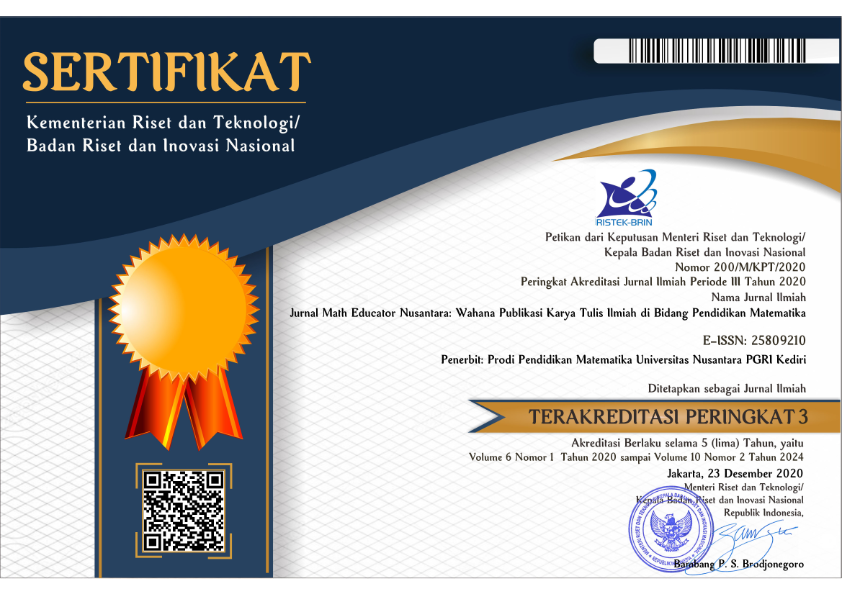Authentic assessment of the ability to critical thinking mathematics of junior high school students in grade VIII on statistics materials
DOI:
https://doi.org/10.29407/jmen.v10i1.20266Keywords:
Authentic Assessment, Mathematical Critical Thinking, StatisticsAbstract
Mathematical critical thinking is essential for students in the twenty-first century. People become more adaptive, open-minded, and better able to react to a range of events and problems as their critical thinking skills grow. The ability for children to think critically is still quite limited. The lack of instruction that fosters mathematical critical thinking skills is to blame for this. After giving students a mathematical critical thinking stimulus while they were studying, this study aims to assess students' capacity to use critical math thinking on statistical content. The research technique used is called qualitative descriptive research. Data collection techniques include test-and-nontest approaches. Analysis of critical thinking skills is done by looking at assessment, assumption analysis, and argument analysis. Students from SMP Negeri 9 Yogyakarta in grade VIII made up the research sample. This research produces three categories of students' critical thinking abilities, namely: 1) high category students are able to analyze assumptions, analyze arguments, and evaluate; 2) medium category students are able to analyze arguments and evaluate, but are still not capable enough to analyze assumptions; and 3) low category students are not yet able to analyze assumptions, analyze arguments, and evaluate.
References
Agus, I., & Purnama, A. N. (2022). Kemampuan Berpikir Kritis Matematika Siswa: Studi pada Siswa SMPN Satu Atap. Jurnal Pendidikan Matematika Raflesia, 07(01), 65–74. https://ejournal.unib.ac.id/index.php/jpmr
Alexandra, G., & Ratu, N. (2018). Profil kemampuan berpikir kritis matematis siswa SMP dengan graded response models. Mosharafa, 7(1), 103–112.
Andriani, J., Setiawan, D., & Husein, R. (2019). Analisis Kesiapan Guru Kelas Dalam Implementasi Penilaian Otentik Pada Kompetensi Ranah Sikap Di Sd Negeri Kecamatan Tebing Tinggi Kota. Jurnal Tematik, 8(2), 172–182.
Arifin, M. (2020). Strategi Pembelajaran Numbered Head Together (NHT) dalam Meningkatkan Minat Belajar Siswa Pada Materi Statistika. Didactical Mathematics, 2(2). https://doi.org/10.31949/dmj.v2i2.2074
Az Zahra, F., & Hakim, D. L. (2022). Kemampuan Berpikir Kritis Matematis Siswa Sma Pada Materi Bangun Ruang Sisi Datar Pasca Pembelajaran Jarak Jauh. Teorema: Teori dan Riset Matematika, 7(2). https://doi.org/10.25157/teorema.v7i2.7221
Basri, H., Purwanto, As’ari, A. R., & Sisworo. (2019). Investigating critical thinking skill of junior high school in solving mathematical problem. International Journal of Instruction, 12(3). https://doi.org/10.29333/iji.2019.12345a
Berpikir, K., Mahasiswa, K., Biologi, P., Penyelesaian, M., Lingkungan, M., Santi, N., Soendjoto, A., & Winarti, A. (2018). Kemampuan Berpikir Kritis Mahasiswa Pendidikan Biologi Melalui Penyelesaian Masalah Lingkungan. Bioedukasi: Jurnal Pendidikan Biologi, 11(1), 35–39. https://doi.org/10.20961/BIOEDUKASI-UNS.V11I1.19738
Chikiwa, C., & Schäfer, M. (2018). Promoting critical thinking in multilingual mathematics classes through questioning. Eurasia Journal of Mathematics, Science and Technology Education, 14(8). https://doi.org/10.29333/ejmste/91832
Dewanti, S. S. (2018a). Keterlaksanaan Penilaian Kompetensi Keterampilan Pada Pembelajaran Matematika Berdasarkan Kurikulum 2013. Jurnal Derivat: Jurnal Matematika dan Pendidikan Matematika 5 (1), 59-68. https://doi.org/10.31316/j.derivat.v5i1.148
Dewanti, S. S. (2018b). Problematika Guru Matematika dalam Menerapkan Penilaian Autentik dalam Kurikulum 2013. Konferensi Nasional Matematika XIX-2018. https://indoms.id/konferensi-nasional-matematika-knm-xix-2018/
Dolapcioglu, S., & Doğanay, A. (2022). Development of critical thinking in mathematics classes via authentic learning: an action research. International Journal of Mathematical Education in Science and Technology, 53(6), 1363–1386. https://doi.org/10.1080/0020739X.2020.1819573
Duron, R., Limbach, B., & Waugh, W. (2006). Critical thinking framework for any discipline. International Journal of Teaching and Learning in Higher Education, 17(2), 160–166.
Endrawati, P., & Aini, I. N. (2022). Deskripsi Kemampuan Berpikir Kritis Matematis Dalam Pembelajaran Relasi Dan Fungsi. JPPM (Jurnal Penelitian dan Pembelajaran Matematika), 15(1).
Ennis, R. H. (1996). Critical thinking dispositions: their nature and assessability. Informal Logic, 18(1996), 165–182. https://doi.org/https://doi.org/10.1353/jge.2007.001 1
Hardiyanto, W., & Santoso, R. H. (2018). Efektivitas PBL setting TTW dan TPS ditinjau dari prestasi belajar , berpikir kritis dan self-efficacy siswa. Jurnal Riset Pendidikan Matemati, 5(1), 116–126. https://doi.org/http://dx.doi.org/10.21831/jrpm.v5il.11127
Hasan, B. (2019). The Analysis of Students’ Critical Thinking Ability with Visualizer-Verbalizer Cognitive style in Mathematics. International Journal of Trends in Mathematics Education Research, 2(3), 142–148. https://doi.org/10.33122/ijtmer.v2i3.97
Hidayat, W., Wahyudin, W., & Prabawanto, S. (2018). The mathematical argumentation ability and adversity quotient (AQ) of pre-service mathematics teacher. Journal on Mathematics Education, 9(2), 239–248. https://doi.org/https://doi.org/10.22342/jme.9.2.5385.239-248
Juliasari, N., & Kusmanto, B. (2016). Hubungan Antara Manajemen Waktu Belajar, Motivasi Belajar, dan Fasilitas Belajar dengan Prestasi Belajar Matematika Siswa SMP Kelas VIII Se-Kecamatan Danurejan Yogyakarta. Jurnal Pendidikan Matematika, 4(3), 405–412.
Juliyantika, T., & Batubara, H. H. (2022). Tren Penelitian Keterampilan Berpikir Kritis pada Jurnal Pendidikan Dasar di Indonesia. Jurnal Basicedu, 6(3), 4731–4744. https://doi.org/10.31004/basicedu.v6i3.2869
Khoirunnisa, P. H., & Malasari, P. N. (2021). Analisis kemampuan berpikir kritis matematis siswa ditinjau dari self confidence. JP3M (Jurnal Penelitian Pendidikan dan Pengajaran Matematika), 7(1), 49–56. https://doi.org/10.37058/jp3m.v7i1.2804
Kurniawan, N. A., Hidayah, N., & Rahman, D. H. (2021). Analisis Kemampuan Berpikir Kritis Siswa SMK. Jurnal Pendidikan: Teori, Penelitian, dan Pengembangan, 6(3). https://doi.org/10.17977/jptpp.v6i3.14579
Mawaddah, S., Noorbaiti, R., Aulia, M., Nur, A., Eryanto, E., & Mahlina, O. (2022). Instrumen Asesmen Kompetensi Minimum Numerasi Konteks Lingkungan Lahan Basah Khas Kalimantan Selatan. EDU-MAT: Jurnal Pendidikan Matematika, 10(1), 24–32. https://doi.org/10.20527/EDUMAT.V10I1.12062
Munajah, R. (2019). Pengembangan Penilaian Otentik Berbasis Website. Jurnal Sistem Informasi dan Sains Teknologi, 1(2).
Nisa Rani, F., Napitupulu, E., & Hasratuddin. (2018). Analisis Kemampuan Berpikir Kritis Matematis Siswa Melalui Pendekatan Realistic Mathematics Education dI SMP Negeri 3 Stabat. Paradikma Jurnal Pendidikan Matematika, 11, 1–7.
Novianti, M. (2019). Efektivitas Pembelajaran Matematika dengan Strategi Heuristik dalam Pendekatan Saintifik ditinjau dari Kemampuan Berpikir Kritis dan Fleksibilitas Representasi Matematis Siswa. Universitas Negeri Yogyakarta.
Nugrahanto, S., & Zuchdi, D. (2019). Indonesia PISA Result and Impact on The Reading Learning Program in Indonesia. Atlantis Press, 297, 373–377. http://puspendik.kemdikbud.go.id/inap-
Nuryanti, L., Zubaidah, S., & Diantoro, M. (2018). Analisis kemampuan berpikir kritis siswa SMP. Jurnal Pendidikan: Teori, Penelitian, dan Pengembangan, 3(2), 155–158. https://doi.org/https://doi.org/10.17977/JPTPP.V3I2.10490
Rahmawati, E., Yuberti, Y., & Irwandani, I. (2020). Pengembangan Instrumen Penilaian Otentik dengan Pendekatan Saintifik pada Pokok Bahasan Gerak Melingkar Kelas X SMA/MA. Gagasan Pendidikan Indonesia, 1(1), 12. https://doi.org/10.30870/gpi.v1i1.8047
Santos, M. B., Kline, K. A., & Choppin, J. M. (2018). Mathematical Literacy in the 21st Century. Handbook of International Research in Mathematics Education. Springer, 587–606.
Sari, R. M., Sumarmi, Astina, I. K., Utomo, D. H., & Ridhwan. (2021). Increasing Students Critical Thinking Skills and Learning Motivation Using Inquiry Mind Map. International Journal of Emerging Technologies in Learning, 16(3). https://doi.org/10.3991/ijet.v16i03.16515
Setiana, D. S., & Purwoko, R. Y. (2020). Analisis kemampuan berpikir kritis ditinjau dari gaya belajar matematika siswa. Jurnal Riset Pendidikan Matematika, 7(2), 163–177. https://doi.org/https://doi.org/10.21831/jrpm.v7i2.34290
Sugiyono. ; 2018. (2018). Metode Penelitian Kuantitatif Kualitatif dan R&D. Bandung: Alfabeta. Angewandte Chemie International Edition, 6(11), 951–952., Septembfile:///C:/Users/asus/Downloads/29-64-1 SM.pdffile:///C:/Users/asus/Downloads/29-64-1-SM.pdfer 2016.
Suhandri, S., Nufus, H., & Nurdin, E. (2017). Profil Kemampuan Koneksi Matematis Mahasiswa dalam Menyelesaikan Masalah Matematika Berdasarkan Level Kemampuan Akademik. Jurnal Analisa, 3(2). https://doi.org/10.15575/ja.v3i2.2012
Sulistyorini, Y., & Napfiah, S. (2019). Analisis kemampuan berpikir kritis mahasiswa dalam memecahkan masalah kalkulus. AKSIOMA: Jurnal Program Studi Pendidikan Matematika, 8(2), 279–287. https://doi.org/https://doi.org/10.24127/ajpm.v8i2.1947
Suryani, T., & Haryadi, R. (2022). Analisis Kemampuan Berpikir Kritis Pada Materi Statistika Siswa Kelas VIII Mts Assalam Pontianak. Jurnal Prodi Pendidikan Matematika (JPMM), 4(1).
Susandi, A. D., Sa’dijah, C., Asari, A. R., & Susiswo, S. (2018). Error Analysis on Prospective Teacher in Solving the Problem of Critical Thinking Mathematics with Apos Theory. ICOSME, 218, 71–75. https://doi.org/10.2991/icomse-17.2018.13
Ulfiana, E., Mardiyana, & Triyanto. (2019). Determining ways to improve critical thinking skills in the math mathematics in student style. Journal of Physics: Conference Series, 1321(2), 3–8. https://doi.org/10.1088/1742-6596/1321/2/022098
Widana, I. W. (2018). Higher Order Thinking Skills Assessment towards Critical Thinking on Mathematics Lesson. International Journal of Social Sciences and Humanities (IJSSH), 2(1), 24–32. https://doi.org/10.29332/ijssh.v2n1.74
Downloads
Published
Issue
Section
License
Authors who publish with this journal agree to the following terms:
- Copyright on any article is retained by the author(s).
- The author grants the journal, the right of first publication with the work simultaneously licensed under a Creative Commons Attribution License that allows others to share the work with an acknowledgment of the work’s authorship and initial publication in this journal.
- Authors are able to enter into separate, additional contractual arrangements for the non-exclusive distribution of the journal’s published version of the work (e.g., post it to an institutional repository or publish it in a book), with an acknowledgment of its initial publication in this journal.
- Authors are permitted and encouraged to post their work online (e.g., in institutional repositories or on their website) prior to and during the submission process, as it can lead to productive exchanges, as well as earlier and greater citation of published work.
- The article and any associated published material is distributed under the Creative Commons Attribution-ShareAlike 4.0 International License













